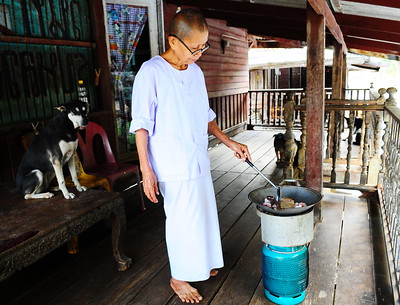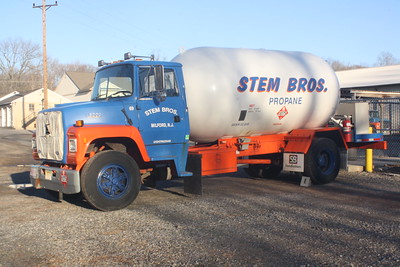
Propane is a type of gas that is commonly used for grilling and other household purposes. Many people are unaware of the fact that propane is a highly flammable gas. Inhaling even a small amount of propane can be extremely dangerous. If you suspect that there may be a propane leak in your home, it is important to take action immediately and call a professional.
But how long does it take for propane to dissipate? That depends on some factors such as the ventilation in the area, the size of the gas leak, and most importantly the temperature of the location where there is an accumulation of propane. Usually, at below 35 degrees, the gas doesn’t dissipate very easily.
It is generally recommended to ventilate a house if it has been filled with gas, even if the gas was only on for a short time. The length of time you will need to ventilate the house will depend on several factors, including the size of the house and how much gas was released. As a general rule, you should open all the windows and doors and allow fresh air to circulate for at least 15 minutes after a gas leak has occurred. This will help to dissipate the gas and reduce the risk of an explosion or other dangerous situation.
When you suspect of gas leak and accumulation of fumes is happening, be aware of the concentration of the gas in the air. Don’t let the concentration reach the upper explosive limit. Ventilate the area in the soonest possible time to dissipate the propane, and open all windows and doors. Turn off the tank immediately, and locate the appliance or connection that causes the leak.
If the propane accumulation is in large quantity, it would take at least 1 hour for the gas to totally dissipate in the surroundings, granting you enough airing and ventilation to get the gas out of the area.
Factors Influencing Propane Dissipation
When you’re dealing with propane, its dissipation rate is influenced by several key factors:
- Temperature: You’ll notice that propane dissipates differently depending on the temperature. In warmer conditions, the propane molecules are more energetic and spread out faster, leading to quicker dissipation. In contrast, cooler temperatures slow down this process, as the molecules move less and take longer to disperse.
- Ventilation: The role of airflow can’t be overstated. In well-ventilated areas, propane gas dilutes and disperses more quickly, reducing potential hazards. If you’re in an enclosed or poorly ventilated space, however, propane can accumulate and pose a greater risk. This makes proper ventilation crucial in managing propane safely.
- Volume and Concentration: The amount of propane that has leaked and its concentration significantly affect how long it takes to dissipate. A larger volume of leaked propane means there’s more gas to disperse, extending the dissipation time. Similarly, the higher the concentration of the gas, the longer it will take for it to dilute to safe levels.
The time it takes for propane to dissipate can vary significantly based on several factors, such as the volume of the leak, environmental conditions (like temperature, wind, and ventilation), and the setting (indoor vs. outdoor). Here are some general guidelines and measurements:
- Outdoor Dissipation: In open outdoor environments, propane, being heavier than air, tends to settle near the ground. However, with adequate wind and ventilation, it can dissipate relatively quickly. The exact time can range from a few minutes to several hours, depending on the conditions.
- Indoor Dissipation: Indoors, propane can accumulate, especially in low-lying areas such as basements. Without proper ventilation, it can take much longer for propane to dissipate. This could range from several hours to a day or more. The key factor here is ensuring adequate ventilation to help disperse the gas.
- Volume and Concentration: The amount of propane released plays a crucial role. A small, controlled release in a well-ventilated area may dissipate in minutes. In contrast, a large leak, especially in a confined space, will take significantly longer.
- Safety Thresholds: For safety, it’s crucial to ensure that propane concentrations fall below the lower flammable limit (LFL), which is about 2.1% in air. Concentrations above this level pose a risk of explosion if an ignition source is present.
Dissipation Time Frame
The dissipation time frame for propane is influenced by a complex interplay of environmental factors, and it’s helpful to understand this in more technical terms.
In open, outdoor environments with adequate ventilation, propane gas typically begins to dissipate within minutes of a leak. However, the complete dispersion can take several hours, depending on factors like wind speed and ambient temperature. For instance, at temperatures above 20°C and with a light breeze of about 5-10 km/h, you might expect the propane to disperse more rapidly, potentially within 1-3 hours.
In contrast, in indoor or enclosed spaces with limited ventilation, the dissipation process is much slower and more variable. Without active ventilation, propane, being heavier than air, can accumulate near the floor and persist for extended periods. In such conditions, complete dissipation might require 24 hours or more, especially if the room temperature is below 15°C, which slows down the molecular activity of the gas.
The volume of the leak and the initial concentration of propane in the air are also critical factors. A small leak in a large, well-ventilated area might dissipate in a matter of hours, whereas a larger leak in the same space could take significantly longer. The initial concentration of propane, often measured in parts per million (ppm), directly affects the time required for the gas to dilute to a safe level, which is typically below the lower explosive limit (LEL) of 2.1% by volume in air.
It’s essential to emphasize that these time frames are estimates. Actual dissipation times can vary widely based on the specific conditions of the leak and the environment. Therefore, safety precautions and professional assessments are crucial in any situation involving a propane leak.
Signs of Propane Accumulation
Propane is a gas at standard temperature and pressure, but it can be easily liquefied when compressed. It is transported in this liquid state in pressurized cylinders or tanks. When released into the atmosphere, propane quickly vaporizes, making it useful as a fuel. However, this also means that it can be dangerous if not used properly, as a propane leak can quickly fill an enclosed space with explosive gas.
A telltale sign of a propane leak is the smell of rotten eggs, or the stench of dead animals, while others compare the smell to open sewage. If the odor is strong enough that it makes you throw up, then a serious leak is somewhere, take action in the soonest possible time. A small spark can cause the propane to ignite and possibly explode – a very dangerous situation you don’t want to happen.
Another sign that there’s a propane leak is a small hissing sound if the tank or valve is open. The hissing may not be audible enough to be heard, but if you stop ask your buddy to still, and turn the TV off, you can hear the small hissing. Again, turn off the tank, and call a technician to locate the leak.
Do you smell persistent minute smell in your kitchen? This is just another possible sign of a propane leak. A small leak when left unnoticed, can cause large accumulation of the gas in the area. Act immediately, don’t let your guard down, and call a qualified person to do the repair.
Safety Measures and Leak Detection
When it comes to propane, ensuring safety and being able to detect leaks promptly are critical. Here’s how you can do that:
Safety Measures to Prevent Propane Leaks
- Regular Maintenance: Routine checks of your propane appliances, tanks, and related equipment are essential. Ensure they are serviced regularly by qualified professionals.
- Proper Installation: Always have propane systems and appliances installed by certified technicians. This ensures that everything is set up correctly and safely.
- Educate Yourself and Others: Familiarize yourself and those around you with the proper operation of propane appliances. Knowing how to use these appliances correctly can prevent many potential leaks.
- Inspect Gas Lines Regularly: Keep an eye on the condition of gas lines. Look for signs of wear and tear, and have them replaced or repaired if they show any damage.
- Proper Storage: Store propane tanks in a well-ventilated area, away from high temperatures and potential ignition sources.
- Use Gas Detectors: Installing propane gas detectors in your home or workplace can provide an early warning in case of a leak.
Detecting a Propane Leak and Immediate Steps to Take
- Smell: Propane has a strong, distinctive smell, like rotten eggs or a skunk’s spray. If you detect this odor, it’s a strong indicator of a leak.
- Listen: Sometimes, a hissing sound can be heard if there’s a leak in a gas line or tank.
- Immediate Action: If you suspect a propane leak, take the following steps:
- Evacuate: Immediately leave the area. Avoid using electrical switches, phones, or anything that could create a spark.
- Shut Off the Gas: If it’s safe and you know how, shut off the main gas supply valve on your propane tank.
- Report the Leak: Once you’re in a safe location, call your propane supplier or the fire department to report the leak.
- Don’t Return Until Safe: Do not go back to the area until a professional has inspected it and deemed it safe.
- Regular Leak Checks: Have a professional periodically check your propane system for leaks, especially if your system is older or has been altered in any way.
By adhering to these safety measures and being vigilant in leak detection, you can significantly reduce the risks associated with propane use.
How Long to Air Out House After Propane Gas Leak?
Airing out your house after a gas leak, such as a propane leak, is an essential step to ensure safety and remove any residual gas. The time required to adequately air out your house depends on several factors:
- Size and Ventilation of the Area: Larger areas with good ventilation will clear out faster than smaller, poorly ventilated spaces. Opening windows and doors to create cross-ventilation helps speed up the process.
- Amount of Gas Leaked: The volume of gas that has leaked plays a significant role. A larger leak will naturally take longer to air out completely.
- Duration of the Leak: If the gas has been leaking for an extended period, it may have permeated more deeply into the house, including furniture, curtains, and other fabrics, necessitating a longer airing-out period.
As a general guideline, it is recommended to ventilate the area for at least an hour after the leak has been stopped and the source of the leak has been fixed. However, in many cases, particularly with larger leaks or in areas with poor ventilation, it may be necessary to air out the space for several hours or even longer.
After ventilating, it’s advisable to use a gas detector or have a professional assess the area to ensure all traces of gas have been removed and it’s safe to re-enter. Always err on the side of caution, and if you’re unsure, seek professional advice. Remember, safety is paramount in these situations.
Does the Smell of Propane Linger?
The smell of propane can linger for a while after it has been used. This is because the molecules of propane are very small and can stay in the air for a long time. If you are using propane for cooking, it is important to ventilate the area well so that the smell does not linger and cause problems for people with respiratory problems.
When propane is burned, it leaves behind a telltale smell. This smell can linger in the air for hours or even days after the propane has been extinguished. If you suspect that there may be propane lingering in your home, it is important to take precautions and call a professional to investigate.
Propane is a highly flammable gas, so even a small amount of propane lingering in the air can be dangerous. If you smell propane, do not attempt to light any flames or electrical appliances. Immediately evacuate the area and call your gas company or a qualified technician to investigate.
While the smell of propane may not be pleasant, it is important to remember that it is also a sign that there could be dangerous gases present in your home. If you suspect that there may be propane lingering in your home, do not hesitate to call a professional to investigate.
What to Do If You Smell Propane
If you smell propane, it’s important to take immediate and cautious action as propane is highly flammable and can pose serious risks. Here’s what to do:
- Do Not Ignite Anything: Avoid any actions that could cause a spark or flame. This includes not using light switches, mobile phones, flashlights, or any electrical appliances. Do not light matches or lighters.
- Evacuate the Area Immediately: Promptly leave the building or area where you smell propane. Ensure that everyone present evacuates as well. Do this calmly but quickly.
- Leave Doors Open: As you leave, open doors to help ventilate the area, but only if it can be done quickly and without causing a delay in evacuation.
- Shut Off the Gas: If you can safely access the propane tank without risking your safety and know how to turn it off, shut off the main gas supply valve by turning it clockwise. If you are unsure or if it’s not safe to do so, leave it and evacuate immediately.
- Call for Help from a Safe Distance: Once you are a safe distance away from the area, call your propane supplier or the fire department to report the leak. Use your mobile phone only when you’re safely away from the area where you smell propane.
- Do Not Return: Do not go back to the area until it has been inspected by a professional and declared safe. This might be your propane supplier or emergency services personnel.
- Have the System Checked: Before using your propane system again, have it inspected by a qualified technician to find and fix the source of the leak.
Remember, propane has a strong, distinctive odor added to it (similar to rotten eggs or a skunk’s spray) to make it detectable in case of a leak. If you smell this odor, always treat it seriously and act swiftly to ensure safety.
What to Do If You See a Propane Leak
If you see signs of a propane leak, such as visible vapor or frost on pipes, it’s crucial to act immediately and cautiously. Propane leaks can be dangerous due to the risk of fire or explosion. Here’s what you should do:
- Avoid Igniting a Flame: Do not light matches, lighters, or any kind of flame. Propane is highly flammable, and even a small spark can trigger an explosion.
- Do Not Operate Electrical Switches: Avoid using anything that could create a spark, including light switches, electrical appliances, and phones. Even turning these devices off can generate a small spark.
- Evacuate the Area: Promptly and safely leave the area where you’ve detected the leak. Ensure that everyone in the vicinity does the same. Do this calmly to avoid panic.
- Leave Doors Open: If possible, leave doors open on your way out to allow the gas to disperse, but only if it does not delay your evacuation.
- Shut Off the Gas: If it’s safe and you’re familiar with the procedure, shut off the main gas supply valve on the propane tank by turning it clockwise. If you’re unsure or if it’s not safe, prioritize evacuation.
- Call for Help from a Safe Distance: Once you are at a safe distance, call your propane supplier or the fire department. Use your phone or a neighbor’s phone, but only after you have evacuated the area.
- Do Not Return Until It’s Safe: Stay away from the affected area until professionals have handled the situation and declared it safe to return.
- Have a Professional Inspect the System: Before using your propane system again, have it thoroughly inspected by a qualified technician to repair the leak and ensure it’s safe to use.
Remember, a propane leak is a serious matter. Taking immediate action to ensure the safety of yourself and others is paramount.
Emergency Procedures and First Aid
In the event of a propane leak or exposure, it’s crucial to act swiftly and safely. Here’s what you should do:
Emergency Procedures for Propane Leak or Exposure
- Immediate Evacuation: If you detect a propane leak, evacuate the area immediately. Avoid any actions that could create sparks, such as flipping light switches, using electrical devices, or starting vehicles.
- Shut Off the Gas: If it’s safe to do so, shut off the main gas supply valve on the propane tank. This step should only be taken if you can access the valve without risk.
- Call for Help: Once you’re at a safe distance, call your local emergency services or the fire department. Inform them about the propane leak and follow their instructions.
- Ventilate the Area: If the leak is indoors and it’s safe to return, open windows and doors to allow fresh air to circulate and help dissipate the gas.
- Do Not Re-enter: Do not go back into the area until it has been declared safe by emergency responders or trained professionals.
First Aid Measures for Propane Inhalation or Exposure
- Move to Fresh Air: If someone has inhaled propane or is experiencing symptoms of exposure (like dizziness, nausea, or headache), move them to an area with fresh air immediately.
- Monitor Breathing: Check if the affected person is breathing. If they are having difficulty or have stopped breathing, begin artificial respiration or CPR if you’re trained, and continue until medical help arrives.
- Seek Medical Attention: Even if the symptoms seem mild, it’s important to seek medical attention as soon as possible. Propane inhalation can cause respiratory distress and other serious health issues.
- Treat for Shock: If the person is showing signs of shock (such as pale, cold, clammy skin), lay them down with their legs elevated and cover them with a blanket. Do not give them anything to drink.
- Contact Poison Control Center: If there’s any suspicion of propane ingestion (though rare), contact a poison control center or seek immediate medical attention.
Remember, the key is to act quickly and calmly. Propane leaks can be hazardous, and prompt action is essential to ensure safety.
To Make a Conclusion
Propane tends to dissipate more rapidly in open, well-ventilated areas, especially at higher temperatures. However, in enclosed spaces with limited airflow, it can remain for much longer, posing significant risks. The specific time frame for dissipation can vary greatly, from a few hours in ideal conditions to potentially days in less favorable ones.
Understanding these dynamics is crucial for ensuring safety in environments where propane is used. Implementing preventive safety measures, being vigilant in detecting leaks, and knowing how to respond in emergency situations are key to managing the risks associated with propane. Remember, while propane is a valuable resource, it requires respect and caution in its handling to maintain safety and well-being.
Continuing from where we left off, the importance of education and awareness around propane cannot be overstated. Knowing how to detect a propane leak, either through its distinctive smell or by hearing a hissing sound, and understanding the immediate steps to take, such as evacuating the area and contacting emergency services, are critical components of safety.
Additionally, regular maintenance and inspection of propane systems play a pivotal role in preventing leaks. This involves routine checks of tanks, appliances, and gas lines, as well as ensuring proper installation and storage of propane equipment.
In case of exposure to propane, prompt first aid measures like ensuring the affected person has access to fresh air and seeking immediate medical attention are essential. These steps are crucial in mitigating the health risks associated with propane inhalation or exposure.
Finally, while propane dissipation times can be estimated based on various factors, these estimates should always be approached with caution. Each situation is unique, and the safety protocols must be adapted accordingly. The overarching message is clear: understanding and respecting the properties of propane and adhering to safety guidelines are indispensable in ensuring a safe and secure environment wherever propane is used.

Mike is an experienced propane technician with over 15 years of professional experience in the field. He has dedicated his career to helping customers with their propane needs, from installation to maintenance and repair. Together with Jeremy, he co-founded this website to provide useful information and guidance to customers seeking reliable propane services.







